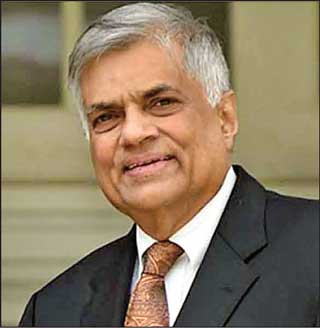Tuesday Feb 17, 2026
Tuesday Feb 17, 2026
Thursday, 23 December 2021 00:16 - - {{hitsCtrl.values.hits}}
 |
| Historically, the UNP has been a significant stabilising factor in the Lankan body politic. It still has a broad and dedicated nascent base at grassroots, waiting for the light of hope
|
The ratings metaphorically talk
Just take a look at the snapshot of Fitch Ratings from April 2020, the commencement of the Yahapalanaya Government under Prime Minister Ranil Wickremesinghe, unto April 2020, the first year of the current regime published by the Financial Times on 20 December 2021;
April 2015 BB-
February 2016 B+
February 2017 B+
December 2018 B
September 2019 B
April 2020 B-
The statistics metaphorically talk; it says bring back Yahapalanaya if this country is to be saved of total disaster.
 What are Fitch Ratings?
What are Fitch Ratings?
Fitch Ratings publishes credit ratings of an entity, obligation or government. These are forward-looking opinions on the relative ability to meet financial commitments. These opinions are based on established criteria and methodology. Fitch Ratings Inc. is an American credit rating agency and is one of the ‘Big Three credit rating agencies.’ The other two are Moody’s and Standard.
A BBB rating, for instance, indicates that expectations of default risk are currently low. The capacity for payment of financial commitments is considered adequate, but adverse business or economic conditions are more likely to impair this capacity. Bonds with a rating of BBB- (on the Standard & Poor’s and Fitch scale) or Baa3 (on Moody’s) or better are considered ‘investment-grade.’ Bonds with lower ratings are considered ‘speculative’ and often referred to as ‘high-yield’ or ‘junk’ bonds. B1/B+ are the highest quality speculative rating, AAA ratings denote the lowest expectation of default risk. AA. represents very high credit quality
Now, the rating is of great importance when a foreign direct investment project is proposed or when debentures are issued. Good credit ratings allow people, companies, and governments to easily borrow from financial institutions or public debt markets.
Yahapalanaya rating
In the case of the period of the Yahapalanaya Government from 2015 to 2019 a B or B+ rating had been consistently achieved. This, to be sure, was not something to cry about from the treetop. It was modest but sound and the fact that the rating showed signs of a further rise to B+ indicated that the government was on the right path toward economic progress and stability. A long way to go, though. But, then, Sri Lanka had been so badly governed in the past that an endemic situation demanded time to heal. Politicians who promise ‘saubhagyaya’ in a jiffy are fooling the people and would have that promise return in a backlash later. Despite our poor record of promises political leaders both of the opposition and government still continue to dish out reckless promises. It is rather better to take the people to their confidence and tell them the truth and give deadlines.
Yahapalanaya missed the opportunity for showcasing
The fact of the Fitch ratings achievement should have warranted the Yahapalanaya Government to use media and broadcast it. On the other hand, Prime Minister Ranil Wickremesinghe and his cabinet ministers did not move in that direction. His then Deputy, Sajith Premadasa, should have fought for his government rather than choose to dawdle in an enclave down south. So should have Harsha De Silva, Eran Wickramaratne and so on who were economists. The latter may perhaps have been hatching to remove the leader. Yahapalanaya should have had an Ajith Nivard Cabraal who goes to the other extreme of hyperbole. It was all a failure in marketing.
Application of marketing principles to governance
The concept of marketing does not narrowly relate to the area of goods and services. We all know that today. There are segments called social marketing, ideas marketing, personality marketing and so on. Contemporary marketing Guru Phillip Kotler, in fact, had sated that Sri Lanka had excelled in the ‘marketing of family planning.’ That was true.
Persons behind a government machinery do not firmly realise that much of their products have to be marketed and that they must be marketed if the programs are to sustain and the government is to sustain because of the program. Almost all marketing strategies relating to production, distribution, promotion and pricing are equally applicable to most government services. The simple reason is that government is a process activated within an electorate framework. The popularity yardstick is key.
Even in many other areas, Yahapalanaya did well. Fostering private enterprise, establishment of law and order, the independent commissions, no state-sponsored oppression or murder, freedom of protest, the introduction of computer literacy in schools, etc. had been just a few other examples. One could have observed a streamlined professionalisation taking place in ministries and agencies. Much of this had space for improvement but the work was in progress. Now, we also know that the alleged Central Bank scam did not in fact, take place.
Only Sirisena upset the apple cart by his subversive and ugly U-Turn.
Even in the matter of Sirisena’s subversion it goes to the credit of Ranil Wickremesinghe for having handled a most outrageous situation appropriately and deftly. The way the 52-day illegal government was dislodged was brilliant!
With not a single hateful expression riled against all these, Ranil Wickremesinghe emerged from all these clouds as a statesman of class.
What would the new Yahapalanaya be?
The old Yahapalanaya has gone, leaving only the leader that gave it philosophical direction. Yes, it has to be old wine but in new bottles. The old wine means the proven principles of good governance, which Yahapalanaya strived to follow. By new blood is meant a younger generation of intelligent and informed leaders in front ranks.
Ranil announced the other day that the UNP has brought in 10 new young professionals to the front ranks and that they would soon be presented to the people. That is welcome news for democrats. The United National Party has done a lot and has had quality leaders at the helm most of the time. Historically, the UNP has been a significant stabilising factor in the Lankan body politic. It still has a nascent base at grassroots, waiting for the light of hope. Maybe a leader will eventually arise from among these ranks as Lalith Athulathmudali did in the old days.
(The writer can be reached at [email protected].)